Nivedita Mookerji in New Delhi
The doyen of Indian real estate, DLF chairman KP Singh, is more keen on philanthropy these days than on the business that he had started decades ago.
After his recently published autobiography Whatever the Odds, he's already looking forward to a biography, where he's known as a giver more than anything else.
He's certain DLF, which is in the process of divesting non-core assets to cut its debt, would be able to overcome the slowing economy and the challenges in the realty sector, with son Rajiv Singh firmly on the driver's seat.
KP Singh spoke to Business Standard on various issues related to business and life. Edited excerpts from the exclusive interview:
Want to stay leader, but it's getting tougher: KP Singh
DLF has gone through various phases. In 1975, you thought of selling the company for Rs 26 lakh (Rs 2.6 million), then the company went pan-India, IPO happened a few years ago and you ventured into other businesses.
What's the next level that you are planning to take DLF to?
We have so much to do.
We were earlier a Delhi-centric company, then we were in NCR, and subsequently went pan-India. Exponential growth is taking place in the real estate sector.
But we will continue to work hard to remain the industry leader.
We should remain leaders in the business but it will become very difficult as more competitors are coming into the business.
. . .
Want to stay leader, but it's getting tougher: KP Singh
We will work very hard, the potential in this sector is very vast.
There is nothing like what's the next level for us.
We just have to expand the area under development. Our job is to satisfy the customer and retain our leadership position and the brand name.
What about going international?
Not as yet. We have too much to do here. . .
. . .
Want to stay leader, but it's getting tougher: KP Singh
You have spoken about collective strength in your book while referring to doing things with other industry leaders like Unitech's Ramesh Chandra and Ansal group's Sushil Ansal. Does the bonding between the realtors still exist?
Well, bonding depends on the individual style of functioning.
I always believe in working together with the team members.
We had a good team.
I always believed two people are stronger than one, and three stronger than two.
But I don't think these young people (at the helm in real estate companies) are such a cohesive team like it should be in an industry organisation.
But eventually with maturity, they will be. . . .
. . .
Want to stay leader, but it's getting tougher: KP Singh
In the business chambers, you will see most industries are quite cohesive, and they work through representatives.
This is because they are regulated properly.
Urban development is not quite like that, but I hope things will change.
What is your approach towards your rivals like Unitech?
We never took them as rivals. We have been together . . . .
They are complimentary forces.
Whoever has a vision of development in the right way, they are our colleagues and are complementary. . .
. . .
Want to stay leader, but it's getting tougher: KP Singh
I have a philosophy that two wrongs don't make one right.
If somebody wants to cut corners and do things the wrong way, they are not our colleagues.
Therefore, it is a process of growth.
The funding problems in the real estate sector have re-emerged. Have we come a full circle from the 70s when real estate financing was a major issue?
In the 70s, the situation was completely different. At that point, private sector was in the banned list when it came to financing projects.
Now, it's a factor of high cost and good quality projects.
The cost is very high now.
. . .
Want to stay leader, but it's getting tougher: KP Singh
If the cost is reduced, the construction and development process will go up.
In the gross domestic product, the greatest employment generator is the construction and development sector.
Seventy two paise of every rupee in GDP is contributed from construction. High cost often prohibits growth.
And India needs growth today because of the young population in the country.
They will demand better jobs and better living.
They will demand better urban governance.
. . .
Want to stay leader, but it's getting tougher: KP Singh
What is DLF's strategy to handle the current economic slowdown and the difficult times in the real estate sector?
My son (Rajiv Singh) runs the company, and he's highly educated and competent to deal with issues.
He was quick enough to re-orient the company.
He has divested some non-core assets and shed manpower.
We are still divesting what we believe is not core.
Lean, hungry, efficient organization is how we are looking at DLF.
Prosperity is the time to practise austerity, and that's what the company has been doing.
. . .
Want to stay leader, but it's getting tougher: KP Singh
There's been much talk on policy paralysis by the government. What's your view on that?
I don't agree with the philosophy of policy paralysis.
I think India is going through a revolution of transparency.
It is a part of our democratic process.
Officials are very careful as they know they are subject to RTI, especially after 2G and CWG scams have been exposed.
Even Anna Hazare's movement has contributed to it.
But, I think there's a slowdown, no paralysis. Even in the case of retail FDI, I believe it will come after the (assembly) elections.
With one-party government, it (multibrand retail FDI) would have come in one stroke. One must understand the coalition compulsions.
The slowdown is a deliberate act of the government to slow inflation, and that has been achieved to some extent.
. . .
Want to stay leader, but it's getting tougher: KP Singh
What is the mood of the businesses or India Inc at this point?
The business mood is a little low.
GDP is lower than what was projected, implying that investment is not taking place due to the high cost of economy .
The high interest rate and tightening flow of money is resulting in slowdown of the economy.
RBI must wear another hat, and ensure a climate conducive for flow of money into business and job creation.
This will lift the confidence level of India Inc.
. . .
Want to stay leader, but it's getting tougher: KP Singh
You have said in your book that you didn't know that a township called Gurgaon would turn the destiny of DLF. Do you see more Gurgaons coming up across the country? What role would DLF play there?
The biggest challenge is urbanisation of India because there will be a massive migration of people from rural to urban areas seeking jobs, according to a McKinsey report.
More important, the average age of Indians will be 29 years by 2020, which is 8 years away.
So, young people will demand job, which will be around urban areas only.
So, the question is how quickly can India accelerate the development process.
To answer your question, yes, more Gurgaons will come up, but the speed must accelerate.
Our company being a leader in the industry will play a role.
But it requires a very aggressive role by not just DLF but several other companies because the job is too big. I don't find any large scale city under construction today anywhere in the country.
. . .
Want to stay leader, but it's getting tougher: KP Singh
You have mingled with leading politicians through the years, including Rajiv Gandhi, Bansi Lal, Devi Lal, just to name a few. Why didn't you join politics?
Since I was interacting with the villagers regularly for acquiring land, people wanted me to contest parliamentary elections in 1984, and I was tempted.
Then my father in law, Chaudhary Raghvendra Singh, who had setbacks during his short political tenure, advised me that two things -- serious businessman trying to reach higher in life and active politics -- don't co-exist.
By nature Im a good listener, I listened to him, and he was correct.
Did you regret that at any point?
No, I didn't regret. If I had taken that decision to join politics, DLF would not have been where it is today.
. . .
Want to stay leader, but it's getting tougher: KP Singh
Youngsters in the family, including your grandchildren, are active in many of the DLF businesses. How's their style of working different from yours?
Everybody has his own style of working.
I was blessed with two great mentors -- George Hoddy (founder of Universal Electric of Michigan) and Jack Welch (former CEO of GE). From them I learnt the importance of acquiring knowledge to do anything well.
I acquired a certain art of working -- from persuading farmers on land issues to dealing with the onslaughts of politicians like Bansi Lal and Devi Lal to focusing on the business, all at the same time.
And I learnt that if you enjoy what you do, it's impossible to get tired.
. . .
Want to stay leader, but it's getting tougher: KP Singh
In fact, when my wife met with an accident some years ago and damaged 18 to 19 bones, I even became a doctor for her.
To learn about the human system, I asked for a skeleton from All India Institute of Medical Sciences and requested the doctor to teach me. . .
The younger generation on the other hand is more impulsive.
They are more intellectual and educated.
But they don't learn the way I did.
They go by what education system teaches them.
I went by my practical experiences.
I didn't have an MBA but I learnt.
Also, I never violated any law knowingly and I don't permit people to violate law.
. . .
Want to stay leader, but it's getting tougher: KP Singh
Coming to Delhi, where growth has been haphazard, do you think vertical growth is the only solution now? Even urban development minister Kamal Nath has recommended vertical growth of Delhi. Your comments?
These are complex subjects.
You must realise that a mistake made in urban development policy cannot be corrected in decades, sometimes in centuries.
Once buildings are erected and roads are laid, it's difficult to change things.
This is unlike the manufacturing sector, where machines and technologies can be changed after an initial mistake, and you are back in business.
In urban development, you can't do that.
I believe there were some fundamental mistakes in the initial planning.
Delhi was planned as a low-rise and garden city, without a long-term vision in mind. It was a good idea, but too idealistic.
. . .
Want to stay leader, but it's getting tougher: KP Singh
Planners should have known that India was going to grow and prosperity comes along with growth.
This aspect was completely forgotten and there was no provision for long-term housing.
The projections went horribly wrong.
Mr Kamal Nath has correctly pointed out that the concept should have always been intensive use of land.
It happens all over the world that the centre of any city feels the pressure more and more as growth comes.
Wise people put highrise structures at the centre of the city and then spread out all across.
In Delhi, it's just the opposite.
Highrise buildings are there in Gurgaon and Noida, while Central Delhi is a lowrise structure.
So, there's no question -- you have to go highrise.
But you can't go highrise everywhere. . .
. . .
Want to stay leader, but it's getting tougher: KP Singh
If you look at the issue of mishandling of allotment of Commonwealth Games Village apartments, what would you say are the problems? Do we need a regulator or an appellate body to resolve such issues?
It has nothing to do with a regulator or an appellate body. It is an issue of planning and also laxity in governance.
If there's a default, like in this case additional construction (floors) was done, strong action should have been taken against the party concerned.
That is, if there was a violation of the law. Demolition is not the answer.
I believe there are enough strong laws in the country to take action against the people involved in the violation.
. . .
Want to stay leader, but it's getting tougher: KP Singh
You have spent years talking to villagers to be able to acquire their pieces of land and compensate them adequately. Do you think a similar case, the Noida land acquisition and compensation issue, was handled the right way?
There was no compulsion on me to provide rehabilitation to the people whose land we purchased in the late 70s and early 80s.
But since I have a rural background, I understood the psyche of the villagers, especially when it came to land.
It's an emotional matter for them.
It's not just about compensating them by paying money, but what they did with that money.
So I went to each village personally, there was no land manager. I assembled all the land myself.
Of course, there was a low key man with me called Amrit Lal Jain, who you can call my lieutenant.
. . .
Want to stay leader, but it's getting tougher: KP Singh
We tried to win the trust of the villagers by getting them to learn about seed farming, new techniques of cultivation etc, helping them with their children's education and jobs.
DLF became part of their families -- and that is called rehabilitation in my sense.
In fact, 90 per cent of these people put the money back in our company.
So, they actually became our bankers for the land that they possessed.
We also had to play a role in settling the issues around Hindu Undivided Families vis-a-vis property for boys and girls.
We could assemble 3,800 acres of land, without a single litigation. In the Noida land acquisition case, the authorities have done fine.
But these issues must be felt from within. You must realise that you are dealing with innocent people.
. . .
Want to stay leader, but it's getting tougher: KP Singh
Looking back, do you think things should have been done differently for a more positive impact on the real estate sector?
See, this was not the way Gurgaon was planned.
Late Rajiv Gandhi also had a vision about Gurgaon -- with wider roads, more greenery and adequate infrastructure financed by the private sector.
The mistake was that the agency for external development became the government.
Money was paid but they did not have the capacity to undertake this large-scale development of infrastructure and could not control the encroachment on the government land.
That's why you find unauthorised development.
I wanted the size of the roads doubled, but the policy makers opposed me.
Since politicians and bureaucracy have their own way of making laws. Lutyen's Delhi, Jaipur and Chandigarh all have wide roads, indicating the vision of the developers.
. . .
Want to stay leader, but it's getting tougher: KP Singh
My vision was different but unfortunately I was not the policy maker.
The new dispensation in Gurgaon is working on wider roads and better infrastructure facilities.
To that extent, we were catalysts, and pace setters. In the times to come, better infrastructure will come based on the lessons learnt in the earlier years.
Gurgaon is still better than many other cities, but that does not satisfy me.
How do you look at the relationship between politics and real estate at this point?
In the 50s, late Jawaharlal Nehru took some great decisions.
But unfortunately, a core element of urban development, which is development of land, was taken away from the private sector and completely given to the public sector.
That's when bodies like Delhi Development Authority were created all over the country.
The hope was that there would be more planned development, farmers would be happy and real estate prices would come down. Just the opposite happened.
. . .
Want to stay leader, but it's getting tougher: KP Singh
Prices skyrocketed, shortages occurred and farmers were more dissatisfied. Around 70 per cent of Indians live in unauthorised habitation.
That decision also resulted in a nexus between unscrupulous developers, corrupt politicians and bureaucrats.
One wrong decision has completely destroyed the skyline of India.
When DLF got involved with development of Gurgaon in the late 70s, it was the first time that this sector was opened to private players by the Haryana government.
Today you find a lot of developers with vision, but still the public sector is exercising its muscle.
But things are much better than what they were ever before. In about a decade, we may see the private sector play a full role in urban development, along with public sector.
. . .
Want to stay leader, but it's getting tougher: KP Singh
Image: K P Singh.The real estate sector is often equated with corruption and fly by night operators. Is that justified?
Things are changing slowly.
Good ministers and bureaucrats can help in cleaning up the sector.
But it's not a central subject, it's a state issue.
So there's a limitation in that sense.
You also have to educate people about urban development, it has been neglected for decades.

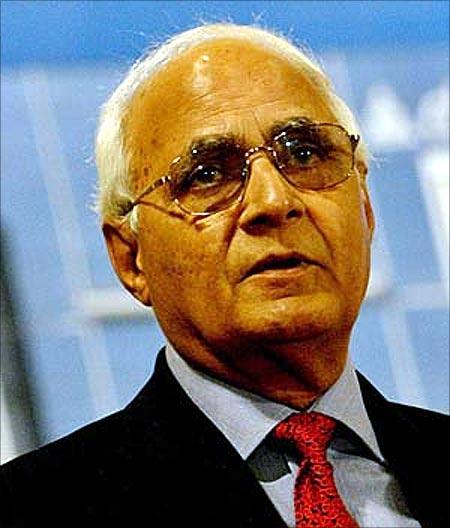
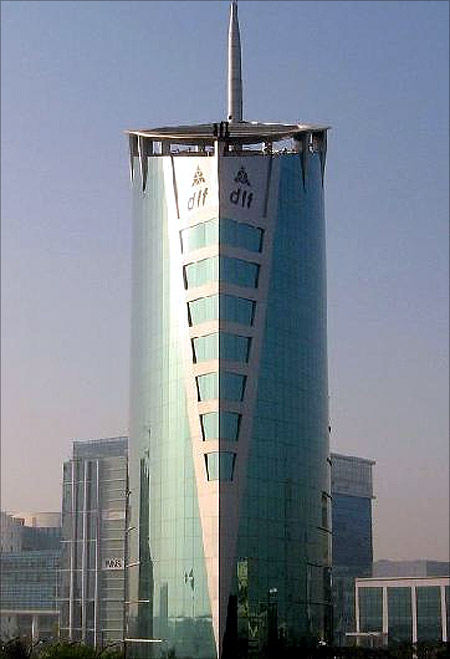
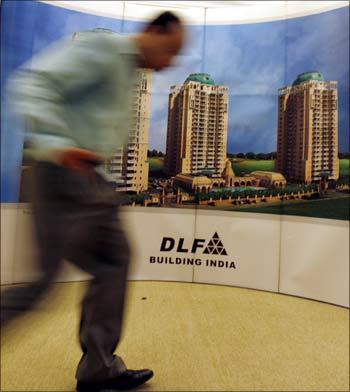
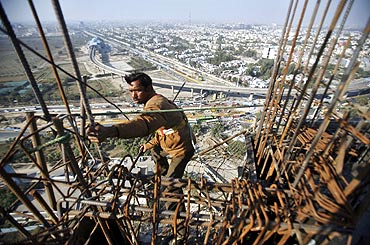
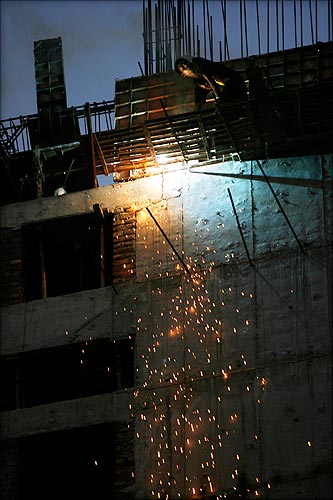
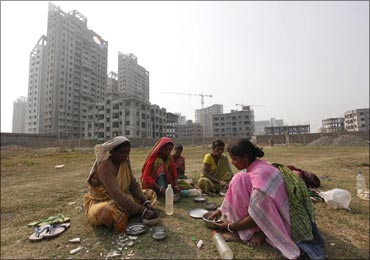
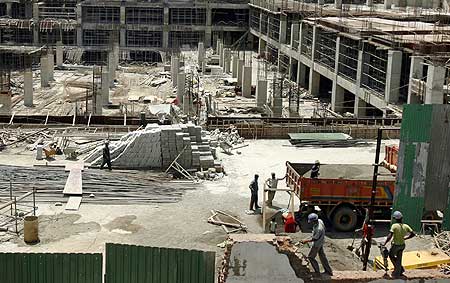
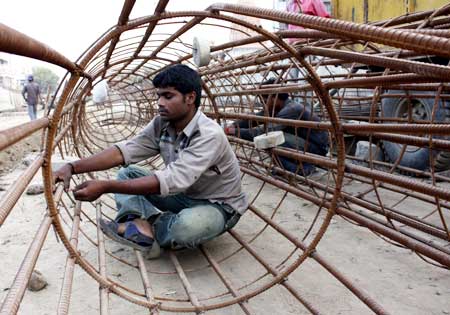
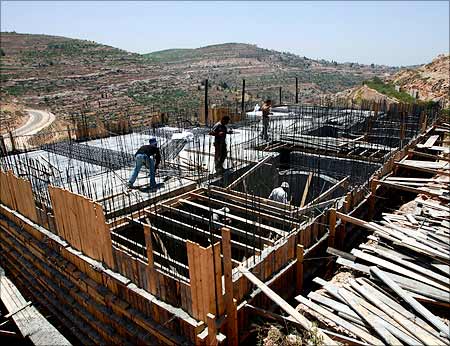

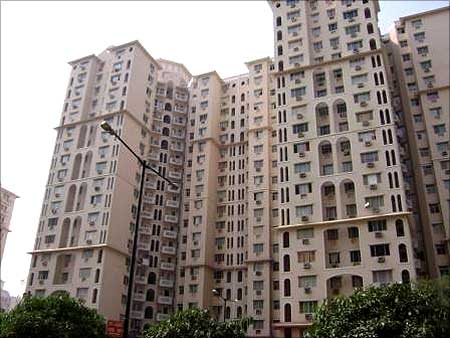


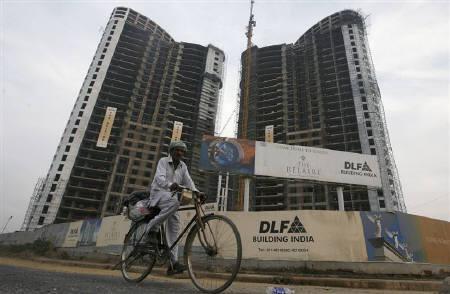
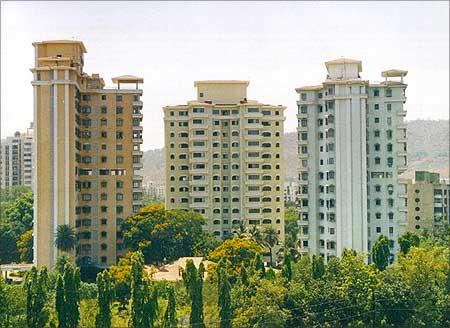





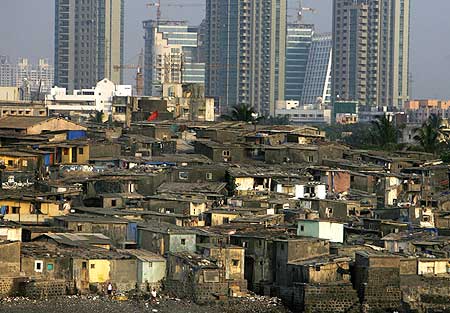
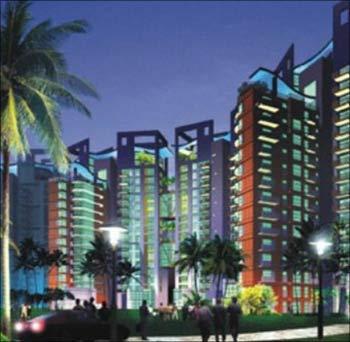
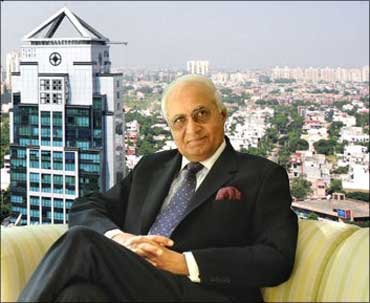

article